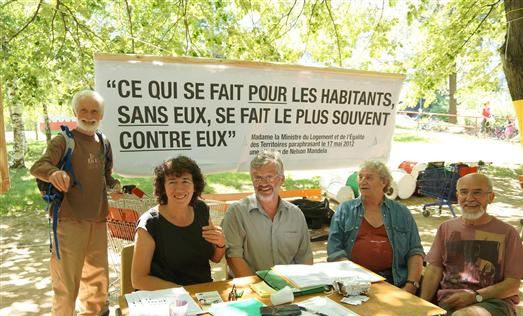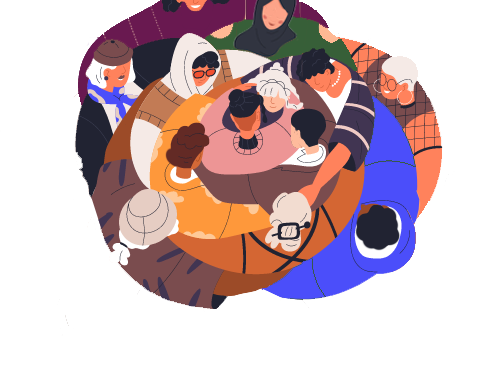This letter is a homage from the Popular Urbanism Workshop (l’Atelier Popular d’Urbanisme, or APU) to André Béranger, a pioneer of the Arlequin (part of the Villeneuve neighborhood of Grenoble), teacher and activist who stood up for human rights throughout his life, particularly concerning the right to education, to housing and to the city.

André Beranger with his wife and friends, 2012.
Arriving in the Arlequin in 1975, André Beranger played an important part in the ambitious educational project of the Villeneuve, which aimed to create schools that were open, without divisions, antiauthoritarian, and liberating. He incarnated the academic revolution that followed May 1968. Faced with the normalization imposed on schools by academic inspectors, he persistently defended the principals stated in the chart of the Villeneuve educational project: co-education, openness and self-governance. Rebel and humanist, indefatigable orator, he sought to materialize the dream of Jean Juarès: that “local communities have the right to implement educational experiments or new curriculums, in order to try new methods or more adventurous doctrines”.
André often expressed indignation in the face of injustice. He led innumerable battles, ceaselessly supporting former students and their families, in addition to his neighbors, the children of the Education Without Borders network, and in a larger sense all who are precariously housed, or without housing. André Beranger was a man of the people. He loved to be surrounded by close ones at public gatherings, spectacles, festivals, and neighborhood celebrations. These essential moments of working-class culture were expressions of equality, neighborliness and friendship between inhabitants. Alongside his wife Ariane, André participated in the creation of the association of the 30 and 40 Arlequin (two of the many contiguous buildings of the megastructure of the Arlequin) to increase the quality of their living environment. He fought for a political practice anchored in daily life, which favorized organization and solidarity between neighbors.
André Beranger remained faithful to the political project of the Villeneuve. Looking towards the future, he considered the Villeneuve to be a common good, which was to be defended and transmitted to future generations by preserving public housing. He co-founded the association Villeneuve Debout in the summer of 2010, as well as the collective against the demolitions of certain buildings in the Arlequin, and supported the creation of the Popular Urbanism Workshop. He was a member of the board of several nonprofit organizations, including le Crieur de la Villeneuve (The Villeneuve Crier, a local newspaper) and Planning, where he fought for the consideration of local issues in a global approach to urbanism. We remember his appeal to the minister Cécile Duflot in 2012, with his banner stating that “that which is done for the inhabitants, without them, is often done against them”. He contributed to propositions for Marie-Hélène Bacqué’s and Mohamed Mechmache’s report “for a radical reform of urban policy”, claiming that “it won’t be done without us anymore”. He was a pillar of the neighborhood roundtable of the Villeneuve, which supported the expression of inhabitants and citizen initiative.
André Beranger defended the social housing of the Arlequin with conviction. Outraged by the demolition of the 50 and then the 20 Arlequin, André fought for the right of the inhabitants to decide the future of their building. His determination lead to an exemplary fight for the defense of social housing alongside the association Résidents Arlequin (residents of the Arlequin), the Right to Housing (le Droit au Logement, an association for the right to housing), and the APU. Such energy was spent organizing petitions, protests, and public assemblies, all leading to the unprecedented creation of the Citizens’ Initiative Referendum (RIC) Arlequin. André Beranger worked to empower those who did not have the power to express themselves. He fought for an experimental democracy with the neighborhood’s educational cafés, which organized gatherings of inhabitants in groups of four or five so that the word of each could be heard. It was these circumstances that allowed collectively decided actions to transform reality. While Planning was experimenting with methods of organizing inhabitants in favor of participative urban planning, he gave us more than a message, but a genuine way of thinking in action: a “school of the Villeneuve”.
With modesty, but without shame, André Beranger carried out his fight against sickness with dignity. Despite difficulties, he continued to be present, active, informed and engaged. André remained without question a major figure of the Villeneuve, as we can tell from the incredible tribute to him, which occurred despite the lockdown that was in place. On the night of his death, dozens of inhabitants came together to sing protest songs to the rhythm of live percussion, chanting his name to the sight of his silhouette in the window of his building in the gallery of the Arlequin. The next day, we had received his message, “I take my leave,” which told us of his final courageous gesture.
Thank you, André. We will continue the battles that were so dear to you. We give our condolences to his family: his wife Ariane, his children Marion, Florence and Sylvain, all his grandchildren, and his neighbors and his friends.
The Popular Urbanism Workshop (APU)




